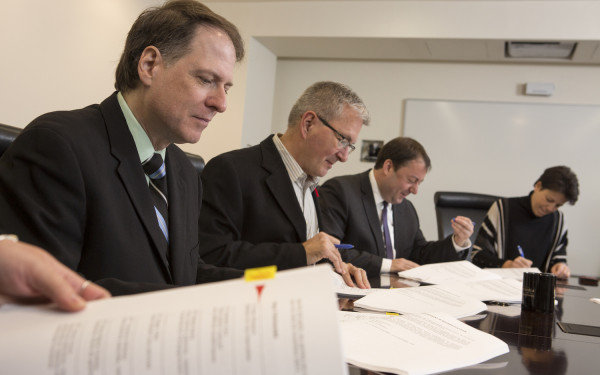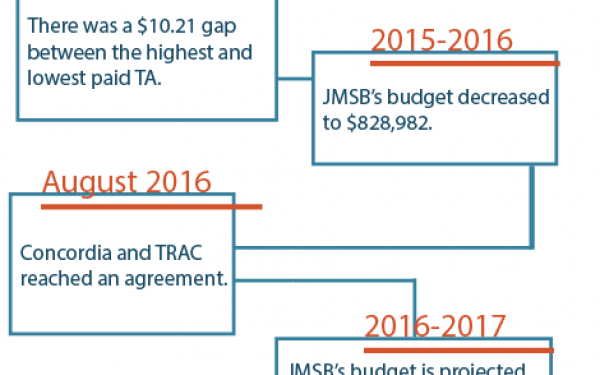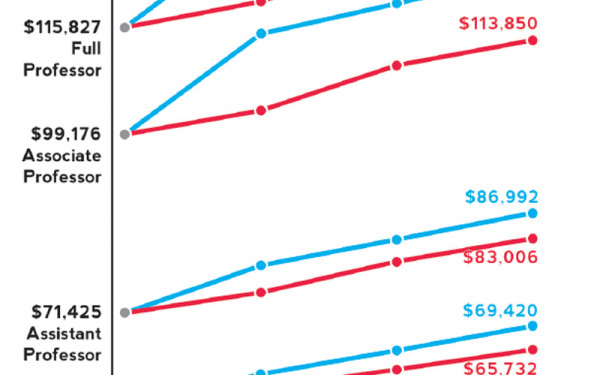Part-Time Faculty Union Concerned Over Ongoing Negotiations
CUPFA Wants More Course Assignments, Administrative Work and Representation
Five hundred and thirty-six days—and counting.
That’s how long the Concordia University Part-Time Faculty Association has been without a collective agreement.
On the homepage of CUPFA’s site, there is a clock counting up the minutes since the union and the university last reached a retroactive agreement in March of 2015. It was only in effect for a month before the clock started ticking again.
The negotiating parties met on Friday, and there are six more dates scheduled from now until December. “I’m concerned at this point,” said CUPFA President David Douglas. “We were not impressed with what happened over the summer.”
“I’m concerned at this point. We were not impressed with what happened over the summer.” —CUPFA President David Douglas
“There are many reasons why an agreement hasn’t been reached yet, with one of the main issues being the number of courses allotted to part-time faculty,” said Patrice Blais, Vice-President Grievance and Collective Agreement.
According to numbers from the university that CUPFA compiled, part-time faculty members have lost 10.8 per cent of available courses since the 2012-13 academic year. The number of courses overall has fallen 4.4 per cent, but full-time faculty have only seen a 0.1 per cent decrease in the same period.
Beginning in the 2014-15 academic year, part-time faculty each received, including vacation pay, $8,327.88 for each three-credit course they taught. The amount of courses a part-time professor can teach is based on a seniority system.
Professors accumulate seniority credits equivalent to the number of credits per course they taught—teaching a three credit class equals three seniority credits.
After reaching certain thresholds, these professors are eligible to teach more classes in one year. For example, part-time faculty with fewer than 24 credits of seniority can only be assigned six credits, if the courses are available.
Part-time professors who have acquired 90 or more seniority credits are capable of teaching up to 18 credits, approximately six classes—again, only if courses are available.
The most compensation a part-time professor can earn is approximately $50,000 per year. But to reach the senior status of having 90 or more credits and be eligible to earn this amount, Blais estimates it can take anywhere from ten to 14 years.
However, being assigned 18 credits actually becomes more probable around the 200 seniority credit-mark, he said. “For some departments, it’s impossible,” he added.
The reason why part-time faculty is losing courses, they say, is because of the university favouring the hires of Limited Term Appointments. An LTA is a shortened contract—maxing out at three years per renewable term with a mandatory two-year waiting period before reapplying—that resides under the Concordia University Faculty Association.
The CUFA (not CUPFA) collective agreement stipulates that LTA members with a 12-month contract must take on a minimum of seven courses per academic year.
From an institutional standpoint, LTAs provide the university with a greater immediate value for money spent than part-time faculty members, Blais explained. He said: “You can pay them less and get more courses.”
An LTA’s pay grade, despite the increased course load, is in a similar range to that of a part-time professor. An LTA lecturer whose contract started June 1, 2016 will have a salary of $57,734 for that first year, increasing to $60,960 in their second year.
The only distinction in pay grade in regards to the number of courses being taught is a $1,500 course preparation stipend for each distinct course beyond five courses.
This means that the amount is only awarded if a member is teaching five or more unique courses, and not multiple sections of the same course. This clause, which takes into account the additional work required of faculty members, is one that CUPFA does not have.
CUPFA argues that LTAs, as described in the CUFA Collective Agreement, are a temporary fix to the faculty shortage problem.
The agreement specifies that those members can only be appointed in one of three situations: Replacing a faculty member on leave, “filling an open probationary position on a temporary basis,” or temporarily teaching a course that requires specific knowledge and background. By filling in these positions with LTAs, they say, the university loses the experience that long-term part-time faculty members bring to the table.
Douglas, president of CUPFA, says part-time professors add sustainability to the university. “There’s institutional memory that comes with part-time [faculty].”
CUPFA is also asking for increased remuneration. Blais wouldn’t specify how much they’re asking for but says they retracted their last offer in September after complications arose during negotiations. The negotiation team for Concordia has also changed since then, Blais said, adding that they have yet to meet the full team.
2web_900_600_90.jpg)
On top of these concerns, Douglas says members of CUPFA want more administrative work, research opportunities, and representation on university bodies such as its pension plan committee.
To meet these demands, the executive of CUPFA is already searching for community support. They plan to garner student solidarity through distributing mini-petition cards addressed to the university administration that read: “I value part-time professors and support their right to undertake and be paid for administrative work on behalf of the students.” Striking is a possibility, Douglas says, but not in the immediate future.
“We can all come to the table and work for the best,” said Douglas, “or I can pull together the pressure and start making things uncomfortable. Those are the two options I have. I’m hoping the university will see that the former is better than the latter—if they don’t, I’ll use the latter.”
The university couldn’t discuss the details of the ongoing negotiation process due to confidentiality, according to spokesperson Chris Mota.

1web_900_612_90.jpg)




_600_375_90_s_c1.jpg)
